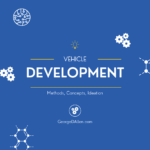New Engineering Ethics: Fundamentals of Product Development

Engineering Ethics:
Introduction - Engineering Ethics
In the dynamic landscape of the automotive industry, the necessity to address multiple recalls underscores the critical importance of upholding engineering ethics. Recalls, particularly those concerning complex safety-related vehicle functions, are not merely setbacks but urgent calls to action. It demands meticulous attention to detail and unwavering commitment to safety standards. Therefore, Engineering Ethics should serve as the guiding compass in such scenarios, emphasizing the paramount importance of integrity, responsibility, and transparency throughout the design, development, and implementation phases.
Shifting from reactive measures to proactive strategies, manufacturers must prioritize Systemic Risk Mitigation practices and robust quality assurance protocols to address potential safety hazards. Moreover, embracing a culture of continuous improvement, stakeholders should collaborate closely to refine existing technologies and innovate new solutions. Hence, this proactive approach not only safeguards consumer trust but also fosters industry-wide resilience and advancement. In essence, the imperative to address multiple recalls in the automotive sector serves as a compelling catalyst for upholding engineering ethics, driving relentless pursuit of excellence and safety in vehicle design and manufacturing processes.
Engineering Ethics: Definition
Engineering ethics is the field of system of moral principles that apply to the practice of engineering. The field examines and sets the obligations by engineers to society, to their clients, and to the profession. As a scholarly discipline, it is closely related to subjects such as the philosophy of science, the philosophy of engineering, and the ethics of technology.
General Reference: https://en.wikipedia.org/wiki/Engineering_ethics
Referencing Objectivist View on Engineering Ethics: https://georgedallen.com/upholding-objectivist-principles-navigating-basic-engineering-ethics/
Development of Requirements
There is a clear necessity to define top-down engineering requirements for all stakeholders underscores the foundational role of Engineering Ethics in the development of requirements. With safety-related vehicle functions at the forefront, precision and clarity in requirements are paramount to ensuring the reliability and effectiveness of complex technologies. Transitioning from conceptualization to implementation, engineers shall adhere to rigorous ethical standards, prioritizing the safety strategy above all else. By delineating top-down requirements, stakeholders establish a robust framework that guides the design, development, and integration of advanced sensing systems. This approach fosters a holistic understanding of system interdependencies and interfaces, as well as facilitates seamless coordination among diverse engineering disciplines.
Verification of the Requirements in the R&D step of Product Development cycle
The verification of requirements in research and development stands as a pivotal stage, guided by principles of Engineering Ethics and aimed at refining the concept prototype. During the development process from theoretical constructs to tangible innovations, this phase is characterized by meticulous scrutiny and rigorous testing to ensure adherence to established standards and user expectations. Consequently, Engineers embark on a journey of exploration and refinement, leveraging a blend of analytical tools and empirical methods to validate the efficacy of proposed solutions.
The development of the concept prototype is subjected to scrutiny through systematic verification processes. They include verification from sensor performance to data processing algorithms, to ensure seamless integration and optimal functionality. Collaboration between interdisciplinary teams and stakeholders fosters a culture of innovation and excellence, driving continuous improvement in occupant sensing technologies. As the backbone of research and development endeavors, the verification of requirements serves as a linchpin in the pursuit of reliability, safety, and user satisfaction.
Understanding the Potential Failures – Development of the comprehensive DFMEA Documentation
The development of Design Failure Modes Analysis (DFMEA) documentation stands as a cornerstone, underpinned by principles of engineering ethics and aimed at ensuring comprehensive documentation for all stakeholders. The analysis is done based on the previous experiences and using the results from the R&D work for the new technology. For the growing complexity of the assembly content, it is important to understand the nature of this work and define the types of Failure modes:
- “Known” failure modes – the potential failures which are understood, tested and mitigated; therefore, for the new product, they can be addressed using the previous experience and test practices
- “Unknown” or missed – the failure modes, which were not on the list and never considered by the stakeholders. These are the results of new interfaces, or new processes, or new utilization / application of the content of the assembly
- “Not Comprehended” or misunderstood – these are thought to be listed and included, but never actually evaluated in this specific content. This is possible for the parts and components, but not integrated assemblies. There are numerous examples of this happening for the subsystems, with new interfaces, or just simply assembled nearby. This is also applicable to the Decision making algorithm of the Autonomous Vehicles, where various requirements are understood, yet the vehicles have collision events in the city environment anyway (check the news)
Example of the misunderstood system level Integration requirements: https://www.clickondetroit.com/news/local/2024/02/06/general-motors-recalls-323k-pickups-for-tailgate-malfunction/
Example of lack of disconnect between the Vehicle Level and lower subsystems requirements: efaidnbmnnnibpcajpcglclefindmkaj/https://static.nhtsa.gov/odi/rcl/2023/RCLRPT-23V228-8035.PDF
Development of the Rigorous Verification and Validation (V&V) Plans
The development of rigorous Verification and Validation (V&V) plans stands as a fundamental pillar, guided by principles of engineering ethics and aimed at ensuring the integrity and reliability of product functions.
Sequentially, Engineering Teams embark on a meticulous journey of planning and execution to verify and validate the functionality of vehicle systems. Through systematic analysis and testing, V&V plans identify critical performance metrics and establish protocols for assessing product conformity to design specifications.
Collaboration among multidisciplinary teams fosters a culture of transparency and accountability, ensuring that all stakeholders are actively engaged in the V&V process. From design engineers to regulatory authorities, V&V plans serve as a comprehensive roadmap, guiding the evaluation of product performance under diverse operating conditions. As an integral component of the development process, rigorous V&V plans not only mitigate risks but also instill confidence among stakeholders in the quality and efficacy of vehicle systems.
Conclusion – Ethics in Systems Engineering
The Ethical Systems Engineering approach shall fosters a holistic understanding of Systems interdependencies and interfaces, as well as facilitate seamless coordination among diverse engineering disciplines.
Embracing transparency and accountability, engineers shall uphold the highest ethical standards, prioritizing the well-being and trust of vehicle occupants above all else.
About George D. Allen Consulting:
George D. Allen Consulting is a pioneering force in driving engineering excellence and innovation within the automotive industry. Led by George D. Allen, a seasoned engineering specialist with an illustrious background in occupant safety and systems development, the company is committed to revolutionizing engineering practices for businesses on the cusp of automotive technology. With a proven track record, tailored solutions, and an unwavering commitment to staying ahead of industry trends, George D. Allen Consulting partners with organizations to create a safer, smarter, and more innovative future. For more information, visit www.GeorgeDAllen.com.
Contact:
Website: www.GeorgeDAllen.com
Email: inquiry@GeorgeDAllen.com
Phone: 248-509-4188
Unlock your engineering potential today. Connect with us for a consultation.


